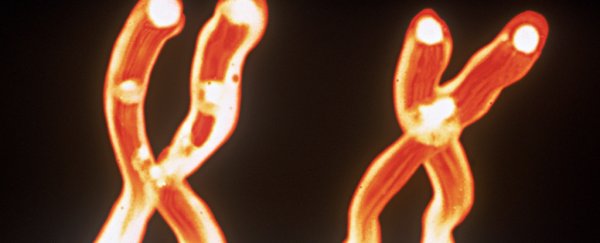Errors in the human genome are a part of life. As we age and DNA replicates, small mistakes creep into our genes – a misplaced letter here or some erroneous repetition there – that can accumulate over time to create a 'mosaic' of cells with unique codes throughout the body. Some cells can even wind up losing whole chromosomes.
One example of this is a condition whereby white blood cells are missing their Y chromosome. Called mLOY (for mosaic Loss Of Y chromosome), it's more common than you might think, occurring in roughly 40 percent of men aged over 70.
Although the Y chromosome has long been considered a shrinking genetic wasteland full of dispensable chunks of DNA, missing a Y chromosome can have serious health consequences.
In epidemiological studies, mLOY has been associated with shorter lifespans and a greater risk of age-related diseases, such as cancer and Alzheimer's disease. Now, the condition could also be linked to impaired heart function, according to a new study mimicking the human condition in mice.
For a while it has been unclear how losing the Y chromosome from blood cells leads to organ damage and disease in other parts of the body, and ups the risk of age-related maladies, particularly cardiovascular disease and stroke.
The team of researchers led by cardiovascular researcher Soichi Sano of Osaka Metropolitan University Graduate School of Medicine in Japan, probed those questions a little deeper, and have shown how mLOY triggers tissue damage that leads to heart failure in mice and is linked to cardiovascular disease.
In the study, the researchers used the famed gene-editing tool CRISPR to engineer mice with no Y chromosomes in their white blood cells to mimic the human mLOY condition.
The CRISPR-ed mice lived shorter lives than unaffected mice, and had increased scarring of the heart, a condition known as cardiac fibrosis that stiffens heart tissues and is linked to heart failure.
"We see that mLOY [in mice] causes the fibrosis which leads to a decline in heart function," says geneticist and senior author Lars Forsberg of Uppsala University.
To test those findings against epidemiological data, the researchers then analyzed data from the UK Biobank, a decades-long study that has captured genetic and health information of some half a million typically aging adults.
They found men with mLOY in their blood at the start of the study had an increased risk of dying from heart failure and other types of cardiovascular disease during the on-average 11 years of follow-up.
"This observation is in line with the results from the mouse model and suggests that mLOY has a direct physiological effect also in humans," says Forsberg.
Of course, way more research is needed before we can map out the direct consequences of mLOY in humans. And keep in mind that losing the Y chromosome is unlikely to be the sole cause of age-related diseases which are linked to a plethora of cellular processes gone awry and a host of genetic changes that have accumulated over time.
As University of Cambridge biologist John Perry told The Atlantic in 2019, after publishing work showing why some are more prone to mLOY than others, "Y-chromosome loss is a manifestation of broader genome instability." Instability which is characteristic of cancer and signals that DNA has been accumulating errors faster than cells can fix them.
Chronic inflammation is another suspected culprit underlying many diseases of aging, including cancer and Alzheimer's. So, as Forsberg and colleagues note, there is more work to be done to untangle the complex interplay between inflammation and fibrosis, and the role of mLOY in both.
Returning to the mouse models for one last hoorah, Forsberg and colleagues also identified a possible treatment to ameliorate the effects of mLOY. Blocking a signaling pathway that was activated in the mice with Y chromosome-deficient immune cells, the researchers noticed the ensuing fibrotic changes were partly reversed.
"The link between mLOY and fibrosis is very interesting, especially given the new treatment strategies for heart failure, pulmonary fibrosis and certain cancers that aim to counteract the onset of fibrosis," says Forsberg.
Although a potential therapy to counteract losing the Y chromosome in blood cells is still a long off, "Men with mLOY could be a patient group that responds particularly well to such treatment," Forsberg added.
But knowing what we do now, stopping smoking would be a wise move too, seeing as research also shows that men who smoke are more than three times as likely as non-smokers to show loss of the Y chromosome in their blood cells.
The study was published in Science.
